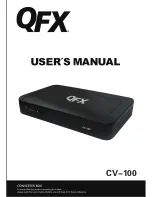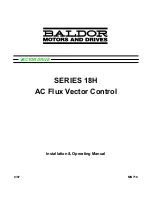
Page 48
©
2017 Sensata Technologies
Troubleshooting
Figure 6-1, Performing an Inverter Reset
6.1.2 Performing a Power Reset (i.e., hard reset)
To perform a power reset (also known as a “hard reset”):
1. Open the inverter’s DC disconnect (or disconnect the positive battery cable to the inverter).
Note:
If performing a “hard reset” on a parallel stacked system with multiple inverters, all the
inverters’ DC disconnects should be turned off “at the same time” (all off within 5 seconds).
CAUTION:
If removing all battery power (positive and negative) to the inverter, do
not remove the DC negative connections to the inverter or any accessory until after
all positive battery connections have been disconnected. This will prevent damage to
the inverter or to any network connected accessory.
2. Ensure the inverter and the remote are disconnected from all AC and DC power (the remote
display will be blank).
3. After the inverter has been disconnected from all power for 30 seconds, reconnect the inverter
DC disconnects (or reconnect the positive battery cable) and resume operation.
Info:
If DC disconnects are not used, there may be a momentary spark when the positive
battery cable is connected to the inverter’s terminal. This is normal and indicates that
the inverter’s internal capacitors are being charged.
6.1
Resetting the Inverter
Under some fault conditions (e.g., an internal fault), the inverter will need to be reset.
WARNING:
A soft reset should not be performed with parallel stacked inverters. If a
reset is required, perform a hard reset instead (see Section 6.1.2).
Prior to performing any reset, ensure all AC power (utility, generator, shorepower) is removed
from the inverter’s input, and all inverter loads are turned off.
CAUTION:
If AC is connected while performing an inverter reset, damage may occur.
6.1.1 Performing an Inverter Reset (i.e., soft reset)
To perform an inverter reset (also known as a “soft reset”):
1. Lightly press and hold the Power ON/OFF pushbutton (see Figure 6-1) for approximately ten (10)
seconds until the Charging/Inverting Status LED comes on and
fl
ashes rapidly (i.e.,
fl
utters).
2. Once the rapid
fl
ashing has begun, release the Power ON/OFF pushbutton. This completes the
“soft reset”.
Note: The Status LED will go off after the pushbutton is released.
3. After the inverter reset is completed, press the ON/OFF pushbutton to turn the inverter ON.
If the inverter reset fails, you will need to perform a power reset using the procedure below in
Section 6.1.2. In either case, if an internal fault does not clear, the inverter will require repair at
an Authorized Service Center (ASC).
Info:
The Power ON/OFF pushbutton on the inverter is a small
momentary
type switch
which operates by lightly pressing and releasing. Only press forward on this switch, do
not press or apply force on the switch sideways or the switch might break.
2. Watch the Charging/Inverting Status LED,
after holding for approximately 10 seconds it
should come on and
fl
ash rapidly (i.e.,
fl
utter)
to indicate the inverter has reset. The Status
LED will go off after the pushbutton is released.
1
. Lightly press and hold (do not release)
the Power ON/OFF pushbutton.













































